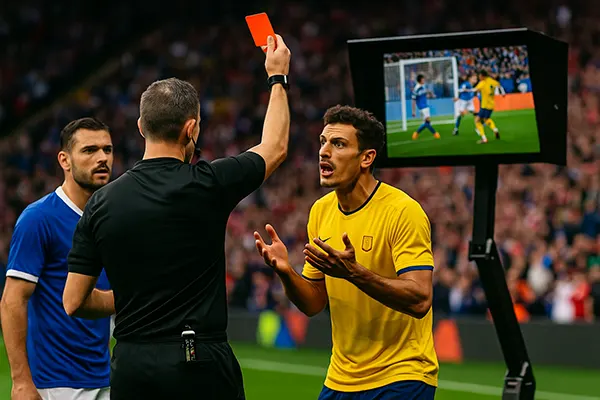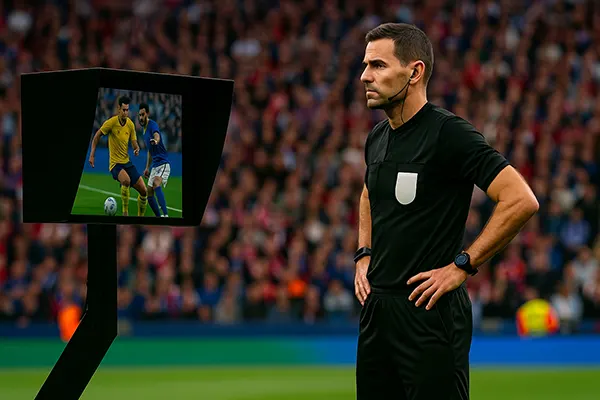How Refereeing Changes and VAR Influence Betting: Insights from the 2024–2025 Seasons

The use of Video Assistant Referees (VAR) and adjustments in refereeing guidelines have become a decisive factor not only in football but also in the betting market. During the 2024–2025 seasons, several high-profile matches demonstrated how technological intervention and evolving rules can alter results, player performance, and ultimately the betting landscape. Understanding these changes provides punters with a more accurate perspective when assessing odds and placing wagers.
Impact of VAR on Match Outcomes
VAR continues to be at the centre of discussions, as it often changes the outcome of crucial moments such as goals, penalties, and red cards. In the current season, its application has increased consistency in decision-making but has also introduced unpredictability that directly affects betting slips.
Bookmakers now factor in the probability of VAR interventions, which influences live betting odds. For instance, markets for “first goalscorer” or “team to score next” can dramatically shift within seconds after a VAR check. Bettors who follow trends and referee tendencies benefit from these shifts.
Statistics from the English Premier League and Serie A in 2024–2025 indicate that over 35% of penalties awarded were the result of VAR intervention. This figure highlights the growing role of technology in shaping not just the sport but also betting strategies.
Adjustments in Betting Strategies Due to VAR
With VAR affecting so many decisive moments, punters have adapted their betting behaviour. Many now avoid early bets on goal markets and instead prefer in-play wagering where they can respond to referee reviews in real time. This reactive approach reduces exposure to overturned decisions.
Another adaptation involves researching referees known for heavy reliance on VAR. Bettors examine patterns such as frequency of reviews, number of rescinded goals, and awarded penalties. Such information helps refine betting models and improve predictions.
Although VAR creates frustration for fans, for analytical bettors it provides an additional layer of measurable data. Those who incorporate historical VAR decisions into their analysis gain a competitive edge over casual punters.
Changes in Refereeing Guidelines
The 2024–2025 seasons have introduced new FIFA and UEFA refereeing guidelines, particularly regarding handball interpretation and player behaviour in penalty areas. These adjustments impact the frequency of fouls, free-kicks, and penalty awards, which in turn reshape betting odds.
Handball rulings remain controversial, but referees are instructed to consider the intent and natural body position more strictly. This has reduced the number of penalties compared to previous years but increased debates over subjective decisions. Bettors who track these nuances can identify value in under/over penalty markets.
Additionally, stricter enforcement of simulation and time-wasting has led to more yellow cards. For betting markets focusing on player bookings and disciplinary records, these rule changes offer more opportunities but also require deeper awareness of referee profiles.
Influence on Disciplinary Betting Markets
One of the fastest-growing areas in betting is the “cards market.” The tougher stance on simulation and dissent has raised the average number of yellow cards per match. Bookmakers now adjust their lines accordingly, but sharp bettors still identify mismatches in odds.
For example, Spanish La Liga saw a 12% increase in bookings during the first half of the 2024–2025 season compared to the previous year. Bettors who noticed this trend early capitalised on “over cards” wagers, demonstrating the importance of monitoring guideline updates.
Another aspect is the growing attention to team discipline statistics. Clubs with aggressive defensive tactics are more exposed under new rules, creating betting opportunities for punters who analyse historical foul and card data.

The Psychological and Financial Dimension
Beyond technical decisions, refereeing changes and VAR influence player psychology and match tempo. Teams become more cautious in physical challenges, and managers adapt tactics to minimise risks of VAR reviews. These subtle shifts create ripple effects in betting markets that reward keen observation.
Financially, betting companies adjust margins to manage the unpredictability introduced by VAR. This impacts payout levels and overall betting value. Punters must account for these hidden costs when calculating expected returns.
Moreover, the increased stoppages caused by VAR reviews influence in-play markets such as total goals and corners. Extended stoppage time has led to more late goals, a pattern visible in the Champions League this season, offering specific opportunities for late in-play betting.
Future Outlook of VAR and Betting
The continued integration of semi-automated offside technology and advanced replay systems suggests that VAR will only become more central to football. While this may enhance fairness, it also increases the complexity of betting markets, pushing punters towards more data-driven strategies.
As bookmakers refine their algorithms to better predict VAR-related outcomes, punters will need to rely on advanced statistical models rather than intuition. This signals a shift in betting from chance-based approaches to analytical frameworks.
Ultimately, the relationship between refereeing changes, VAR, and betting will keep evolving. For punters willing to adapt, it provides both challenges and opportunities, ensuring that knowledge and preparation remain the key to success in the modern football betting environment.




